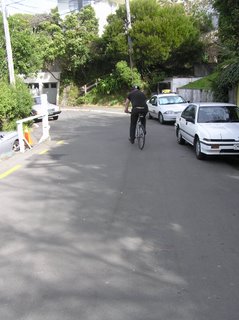The Road Ahead / Paul Metz

From: "Paul Metz"
Bryan,
In addition to the introduction of Land Value Taxation instead of existing counterproductive taxes on property, I believe that a broad tax reform is a- if not THE - key instrument to achieve a sustainable, i.e. fair for all the world's citizens and ecologically future-proof. That reform can - and should for political acceptance - be revenue neutral and give price incentives that benefit 'goods' and punish 'bads'.One consequence of this concept I have started to promote recently: the recognition that all world's citizens have equal right to emit greenhouse gases. The new foundation B4FET - Business for Fair Emission Trade - will try to educate the negotiators of the Kyoto Protocol and help establish an allocation of emission rights mechanism that is fair and, as a consequence, attractive for the citizens of all countries (not necessarily for the ruling elites). Key outcome would be that each citizen - as a shareholderof Earth's Global Commons - has an annual coupon, which can be sold and generates a "microdividend". This combines climate protection with fair trade and poverty alleviation, also within rich countries - or, as Dave names it, 'redistribution of wealth'. In my experience 'fair trade' is much less unwelcome in the mainstream than 'redistribution of .... anything'.I hope to inform on B4FET soon; we are now acquiring Dutch sponsors first. Now my weekend is over, I have some clients waiting and look forward to rejoin you next week. Paul Metz Sent: maandag 30 januari 2006 21:50
To: 'Paul Metz'
Subject Oil
Paul
I see we agree on the kind of measures needed but I'm not sure about implementation and political will. I'm all ears on any suggestions about getting the global community to co-operate in time. Recently I watched the Indian Minister for the Environment say that India wanted to do its share of polluting and wasting. We in the West have been very hypocritical with our demands and we show little sign of changing. China feels the same way, not to mention the list of developing countries. I agree we are on our own.
Cheers
Bryan
From: Paul Metz
Sent: Tuesday, 31 January 2006 11:41 a.m.
To: 'Bryan Pepperell'
Subject: Environment and Oil
Bryan,
It is even worse: it is in our self interest to make the growth of India, China, etc sustainable. And our leaders do not realize that, they let 'unsustainable outsourcing' happen and thus destroy the planet faster than ever before.
Yes, good governance is the scarcest resource on Earth, precautionary approaches are illusions as a result. But we should not stop promoting and practising them ....
Paul
To: Paul Metz
The Netherlands
Subject Oil
By now the world is using one thousand barrels of oil a second. Your own examples show that demand can only increase with outsourcing.
We can only continue to speak out about this (coming?) crisis. It appears to be moving into a terminal stage.
Perhaps other people in the political strata will begin to speak up. I live in hope.
Cheers
Bryan Pepperell
Wellington
New Zealand


1 Comments:
Thanks Bryan,
Whilst I agree entirely with what Dave (Vice Chair Transort for London) and Paul say about the need to redistribute wealth and stop taxing positives, the argument goes much further.
We really should be asking why we use GDP (Gross Domestic Product) at all, as a measure of economic wellbeing. The evidence is irrefutable that not only is GDP a completely outdated measure, but also that GPI (Genuine Progress Index) is a far better measure of economic (and social) wellbeing.
For those who are still unfamiliar with GPI, it is an index which assigns positive values to positive actions and negative values to negative actions. Under our current [GDP] system, creating pollution and carrying out eco-vandalism are encouraged, since they contribute to GDP growth and GDP simply measures the transfer of money from one place to another, rather than the creation of true wealth; measurement of GDP takes no account of the destruction of the environment or the destruction of the social fabric that usually result from our so-called progress.
When real quality of life is measured (by the GPI) we find that in most nations the peak was reached in the period late 1960s to early 1980s and we have been steadily going downhill ever since.
Of course, as with every other issue we discuss, the combination of ignorance, complacency and vested interest prevent us making any progress in establishing the Genuine Progress Index. We might also add that an acknowledgement that we are going backwards in real terms would be just too much for the economists to bear -thus we are forced by them to continue using GDP and keep up the pretence that we are going forward! Sadly, it therefore follows that we will continue to go backwards!
What disturbs me most is that the rate at which we are goiuing backwards [in real terms] is accelerating; overpopulation, global warming, water depletion, energy depletion, deforestation, loss of biodiversity, dead zones in the oceans etc. are all symptons of a dysfunctional economic system and all taking an ever increasing toll on society.
Fortuantely we won't have to wait too much longer for Peak Oil and Global Warming to bring the whole house of cards down. But what are we going to be left with? A desolate, overheated husk of a planet with energy sources so depleted we will be unable to repair anything?
Kevin
PS you are welcome to add this to your blog if you think it contributes something new to the debate.
Post a Comment
<< Home